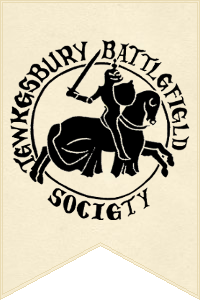May 3rd 1471: Hopes dashed at Gloucester
Not Welcome at Gloucester
(Graham Turner: Studio 88)
As soon as Edward learned where the Lancastrians had gone, he acted to frustrate their entry into Gloucester:
Early in the morning, soon after three of the clock, the King had certain tidings that they had taken their way by Berkley toward Gloucester, as so they took indeed. Whereupon he took advice of his counsel of that he had to do for the stopping of their ways, at two passages afore named, by Gloucester, or else by Tewkesbury, and, first, he purveyed for Gloucester, and sent thither certain servants of his own to Richard Beauchamp, son and heir to the Lord Beauchamp, to whom afore he had committed the rule and governance of the town and castell of Gloucester, commanding him to keep the town and castle for the King, and that he, with such help as he might have, should defend the same against them, in case they would in any wise assail them; as it was supposed they so would do that same aforenoon ; letting them know that he would have good espye upon them if they so did. And, if he might know that they so did, he promised to come their rescue, and comfort. With this the King’s message they were well received at Gloucester, and the town and castell put in sure and safe keeping of the said Richard, and the said King’s servants.
Margaret’s army arrived at Gloucester at ten in the morning, after a long march through the night, Richard Beauchamp had followed instructions and closed the gates. She had a hostile reception, despite the many of the citizens of the city having Lancastrian sympathies.
Margaret now had a dilemma. Her objective had been to cross into Wales to join with Jasper Tudor’s recruits and then travel north to her trusted men of Cheshire and Lancashire. The way to Wales was over the Severn Bridge, which could only be reached through the gates of the City of Gloucester.
Their first impulse was to make as if to assault the walls but Richard Beauchamp, and Queen Margaret, knew that this was a forlorn hope. King Edward was nearby and if they were caught between his army and the city’s defenders then that would have been the end of their adventure.
The decided to march on towards Tewkesbury, looking for a means of crossing the Severn. They trudged around the city walls, from the Southgate to the Northgate to continue their journey. To add to their woes, some of the heavy guns laboriously dragged from Bristol were captured by Richard Beauchamp’s men, sallying out of the city and attacking their rear.
Therefore, they shortly took their conclusion for to go the next way to Tewkesbury, whither they came the same day, about four after noon. By which time they had so travailed their host that night and day that they were right weary for travailing; for by that time they had travelled xxxvj long miles, in a foul country, all in lanes and stony ways, betwixt woods, without any good refreshing.
At Tewkesbury, there was no choice but to stop. The foot soldiers could not travel any further and even the horsemen were ‘right weary’, as were their horses.
So, whether it were of their election and good will or no, but that they were verily compelled to bide by two causes; one was, for weariness of their people, which they supposed not their people would have any longer endured; another, for they knew well that the King ever approached towards them, near and near, ever ready, in good array and ordinance, to have pursued and fallen upon them, if they would any further have gone, and, peradventure, to their most disadvantage. They therefore determined to abide there the adventure that God would send them in the quarrel they had taken in hand. And, for that intent, the same night they pight them in a field, in a close even at the town’s end; the town, and the abbey, at their backs; afore them, and upon every hand of them, foul lanes, and deep dikes, and many hedges, With hills, and valleys, a right evil place to approach, as could well have bene devised.

